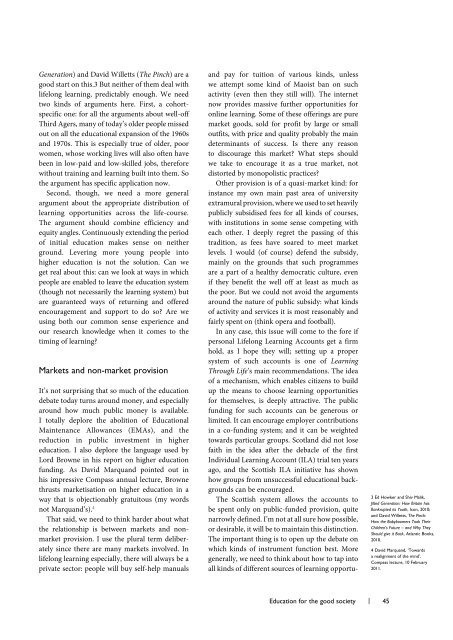EDUCATION FOR THE GOOD SOCIETY - Support
EDUCATION FOR THE GOOD SOCIETY - Support
EDUCATION FOR THE GOOD SOCIETY - Support
You also want an ePaper? Increase the reach of your titles
YUMPU automatically turns print PDFs into web optimized ePapers that Google loves.
Generation) and David Willetts (The Pinch) are agood start on this.3 But neither of them deal withlifelong learning, predictably enough. We needtwo kinds of arguments here. First, a cohortspecificone: for all the arguments about well-offThird Agers, many of today’s older people missedout on all the educational expansion of the 1960sand 1970s. This is especially true of older, poorwomen, whose working lives will also often havebeen in low-paid and low-skilled jobs, thereforewithout training and learning built into them. Sothe argument has specific application now.Second, though, we need a more generalargument about the appropriate distribution oflearning opportunities across the life-course.The argument should combine efficiency andequity angles. Continuously extending the periodof initial education makes sense on neitherground. Levering more young people intohigher education is not the solution. Can weget real about this: can we look at ways in whichpeople are enabled to leave the education system(though not necessarily the learning system) butare guaranteed ways of returning and offeredencouragement and support to do so? Are weusing both our common sense experience andour research knowledge when it comes to thetiming of learning?Markets and non-market provisionIt’s not surprising that so much of the educationdebate today turns around money, and especiallyaround how much public money is available.I totally deplore the abolition of EducationalMaintenance Allowances (EMAs), and thereduction in public investment in highereducation. I also deplore the language used byLord Browne in his report on higher educationfunding. As David Marquand pointed out inhis impressive Compass annual lecture, Brownethrusts marketisation on higher education in away that is objectionably gratuitous (my wordsnot Marquand’s). 4That said, we need to think harder about whatthe relationship is between markets and nonmarketprovision. I use the plural term deliberatelysince there are many markets involved. Inlifelong learning especially, there will always be aprivate sector: people will buy self-help manualsand pay for tuition of various kinds, unlesswe attempt some kind of Maoist ban on suchactivity (even then they still will). The internetnow provides massive further opportunities foronline learning. Some of these offerings are puremarket goods, sold for profit by large or smalloutfits, with price and quality probably the maindeterminants of success. Is there any reasonto discourage this market? What steps shouldwe take to encourage it as a true market, notdistorted by monopolistic practices?Other provision is of a quasi-market kind: forinstance my own main past area of universityextramural provision, where we used to set heavilypublicly subsidised fees for all kinds of courses,with institutions in some sense competing witheach other. I deeply regret the passing of thistradition, as fees have soared to meet marketlevels. I would (of course) defend the subsidy,mainly on the grounds that such programmesare a part of a healthy democratic culture, evenif they benefit the well off at least as much asthe poor. But we could not avoid the argumentsaround the nature of public subsidy: what kindsof activity and services it is most reasonably andfairly spent on (think opera and football).In any case, this issue will come to the fore ifpersonal Lifelong Learning Accounts get a firmhold, as I hope they will; setting up a propersystem of such accounts is one of LearningThrough Life’s main recommendations. The ideaof a mechanism, which enables citizens to buildup the means to choose learning opportunitiesfor themselves, is deeply attractive. The publicfunding for such accounts can be generous orlimited. It can encourage employer contributionsin a co-funding system; and it can be weightedtowards particular groups. Scotland did not losefaith in the idea after the debacle of the firstIndividual Learning Account (ILA) trial ten yearsago, and the Scottish ILA initiative has shownhow groups from unsuccessful educational backgroundscan be encouraged.The Scottish system allows the accounts tobe spent only on public-funded provision, quitenarrowly defined. I’m not at all sure how possible,or desirable, it will be to maintain this distinction.The important thing is to open up the debate onwhich kinds of instrument function best. Moregenerally, we need to think about how to tap intoall kinds of different sources of learning opportu-3 Ed Howker and Shiv Malik,Jilted Generation: How Britain hasBankrupted its Youth, Icon, 2010;and David Willetts, The Pinch:How the Babyboomers Took TheirChildren’s Future – and Why TheyShould give it Back, Atlantic Books,2010.4 David Marquand, ‘Towardsa realignment of the mind’,Compass lecture, 10 February2011.Education for the good society | 45





![[2012] UKUT 399 (TCC)](https://img.yumpu.com/51352289/1/184x260/2012-ukut-399-tcc.jpg?quality=85)





![Neutral Citation Number: [2009] EWHC 3198 (Ch) Case No: CH ...](https://img.yumpu.com/50120201/1/184x260/neutral-citation-number-2009-ewhc-3198-ch-case-no-ch-.jpg?quality=85)




